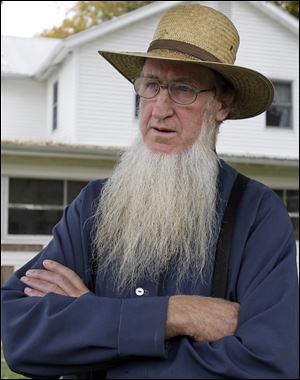
Head of Amish group convicted of hate crimes in beard-cutting attacks asks for light sentence
2/2/2013
Sam Mullet Sr. stands in the front yard of his home in Bergholz, Ohio.
An attorney for the leader of an Amish breakaway group convicted of hate crimes in beard- and hair-cutting attacks has asked a federal judge for a light sentence, saying what happened was no more than a minor assault.
Samuel Mullet Sr.'s attorney said in court documents filed Friday that Mullet has no criminal history and that the 67-year-old is hardly a threat to commit any more crimes.
Mullet is scheduled to be sentenced next Friday in U.S. District Court in Cleveland and faces up to life in prison. But his attorney argued that a sentence of 18 months to two years is more appropriate.
Defense attorney Ed Bryan said Mullet is facing the same sentence as those given to several notorious killers including Unabomber Ted Kaczynski, Atlanta Olympics bomber Eric Rudolph, and Jared Lee Loughner, who's serving seven consecutive life terms gunning down six people and injuring former Arizona congresswoman Gabrielle Giffords.
"Non-drug federal life sentences are thus typically reserved for the most heinous of crimes involving murder," Bryan wrote.
Mullet was one of 16 people convicted in the hair-cuttings who came from the Amish settlement that he founded in the eastern Ohio town of Bergholz near the West Virginia panhandle
All are scheduled to be sentenced next week.
The government said the cuttings were an attempt to shame members of the Amish community who he believed were straying from their beliefs. His followers were found guilty of carrying out the attacks, which terrorized the normally peaceful religious settlement.
Prosecutors and witnesses described how sons pulled their father out of bed and chopped off his beard and how women surrounded their mother-in-law and cut off two feet of her hair, taking it down to the scalp in some places.
Prosecutors say they targeted hair because it carries spiritual significance in their faith.
Mullet wasn't accused of cutting anyone's hair. But prosecutors said he planned and encouraged his sons and the others and mocked the victims in jailhouse phone calls.
Mullet's attorney said in the court filing that no one suffered any serious physical harm and that Mullet is now suffering "invisible" penalties that go beyond the courtroom.
"A significant collateral consequence for Mullet is the loss of his privacy and the smearing of the reputation of the Bergholz Amish community," Bryan wrote. "Most important to Mullet, however, is the damage suffered by the Bergholz Amish community as a whole."
Prosecutors say Mullet thought he was above the law and free to discipline those who went against him based on his religious beliefs. Before his arrest last November, he defended what he believes is his right to punish people who break church laws.
The hair cuttings, he said, were a response to continuous criticism he'd received from other Amish religious leaders about him being too strict, including shunning people in his own group.